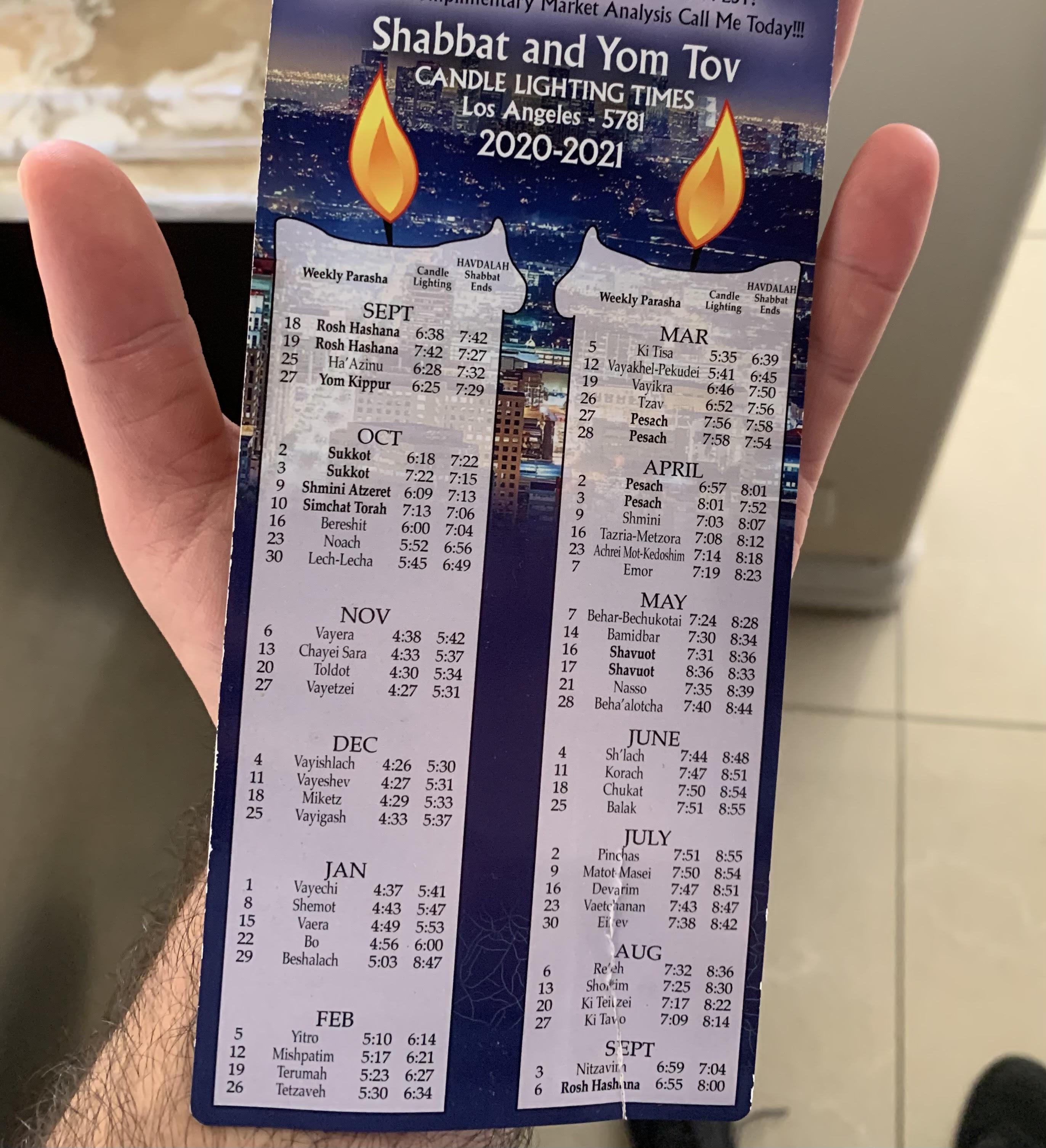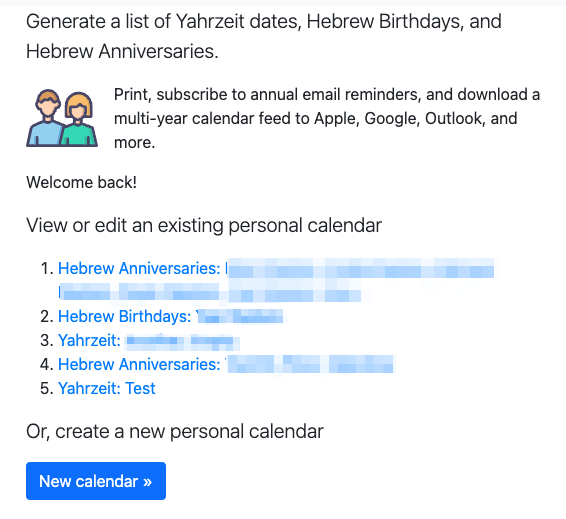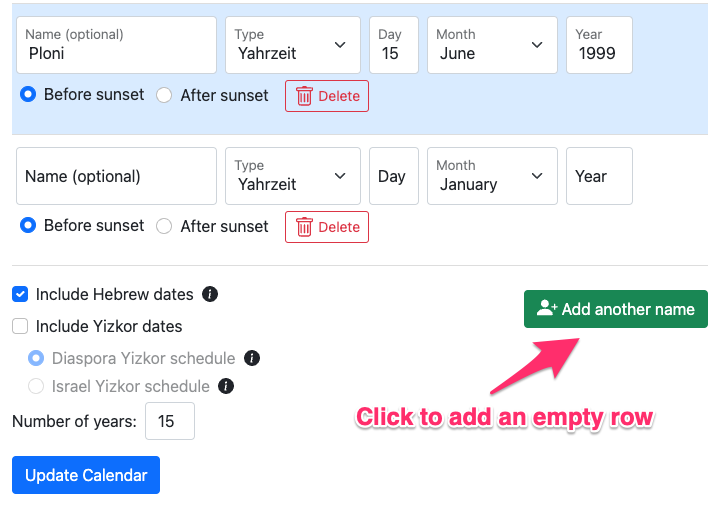
 Bar/bat mitzvah calculator
Bar/bat mitzvah calculator
Dear Hebcal team, I would love to have a function, either on your site or code I could put on our synagogue website, where you simply put in the Gregorian date of birth and it gives you the shabbat after 13 (or 12) years and a day later. Does that already exist? If not, would it be easy to create? (If you do it, please have language functions so that it would display in French!) Thank you so much.
Josh

Thanks for the suggestion! We don't currently offer such a feature and it would be a great addition.
Chabad does offer this feature on their website

 HEBEVENTS returns diaspora event only
HEBEVENTS returns diaspora event only
When calling the GoogleSheets HEBEVENTS function with the date of May 27th (2023) the result is "Shavuot II", though in Israel this is a regular "Parashat Naso".
I think we better have another parameter saying whether the client needs Israel or diaspora events.
Thank you so much for this service!!
It is unbelievable how useful and helpful it is, for so many Jews around the world.
חזקו ואימצו

Hi, shavua tov. The Hebrew Date Converter Google sheets Add-on was built by an independent organization called YML Solutions.
https://workspace.google.com/marketplace/app/hebrew_date_converter/70892373699
This plugin uses the Hebcal APIs but otherwise we aren't affiliated with their product. You will need to contact them directly to ask them to make the change to add an optional Israel boolean parameter to their function.
We are truly sorry we can't help further with this issue.

 Shabbat times enter a and exit are the same
Shabbat times enter a and exit are the same
I run the hebcal on Google pixel4 graphineos for some strange raison the time of entre and exit of Sabbath are the same. Any idea why?

 Embedding Shabbat candle lighting times API with the ability to select different locations (like Chabad's)
Embedding Shabbat candle lighting times API with the ability to select different locations (like Chabad's)
We need someone who can integrate the HebCal Shabbat candle lighting times API with the ability for visitors to input their local location into our wordpress website? We've tried to follow the documentation but need help. Willing to pay. Email npool32@aol.com

 Candle Lighting Times / Shabbat ? Chag End Times in Los Angeles 2022-2023
Candle Lighting Times / Shabbat ? Chag End Times in Los Angeles 2022-2023
Hi - I need a candle lighting and shabbat/chag end time chart for the upcoming year of 2022-2023. How can i create one for Los Angeles?
Thanks
Something that looks like this picture


Hi, thanks for contacting Hebcal.
Yes! Check out this page:
Candle-lighting Times Year at a Glance
Fill out the form below to get Shabbat and holiday candle lighting times and Parashat haShavuah (weekly Torah Portion) for the entire year on a single page. You can print it out and post it on your refrigerator.
https://www.hebcal.com/home/shabbat/fridge
Shabbat shalom!

 Reading dates for the Five Megillot
Reading dates for the Five Megillot
The Eicha (Book of Lamentations) reading is coming up on Tisha B'Av Saturday night August 6, 2022 following Shabbat.
Michael, could you kindly include a csv (ranging years 5780 to 5793) for the Five Megillot which contains reading dates for Book of Lamentations (Eicha - Tisha B'Av), Book of Esther (Purim), Song of Songs (Sabbath of Passover), Book of Ruth (Shavuot), and Ecclesiastes (Sukkot)
Are these books read in their entirety or are only some of their chapters read?

 sephardi torah/haftarah readings
sephardi torah/haftarah readings
Sephardi readings are often different. For instance, on Shabbat Pesach I, we read an additional verse (Joshua 6.27) at the end of the standard reading.
HebCal does not show these differences. Which makes it an unreliable resource for sephardim. Which is a shame - as it's fixable. It would be great if you fixed it! Then you'd have a resource for all of Am Yisrael.

 Emoji's for Holidays
Emoji's for Holidays
Hi,
I love the feature you added in the Calendar with the emoji's for the holidays.
Here some suggestions, I was missing:
Purim: Performing Arts & Scroll
Pessach: Rice Cracker & Wine Glass
Sukkot: Lemon & Herb
(Names from emojipedia.org)
Rgrds

 Javascript to export to a text file
Javascript to export to a text file
The header says it all. I need to run a script to download and write the result to a textfile.

Try this API. This is the best we can offer. Good luck and Shabbat shalom!
https://www.hebcal.com/home/219/hebrew-date-converter-rest-api

 Want to add a new yahrzeit to my list of yahrzeits
Want to add a new yahrzeit to my list of yahrzeits
Please help. Don't know how to add a new yahrzeit to my list of yahrzeits on HebCal. using Mac OS 12.1 (Monterey).
Thanks!

If you return to the https://www.hebcal.com/yahrzeit page from the same web browser you used earlier, you should now see a page that lists your previously created calendars:

Then, click on an existing personal calendar link.
Near the bottom of the page, you'll see a green button that says "Add another name"

Fill out the new row and click the blue "Update Calendar" button at the bottom of the page.
Customer support service by UserEcho

